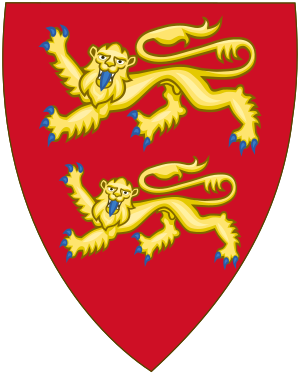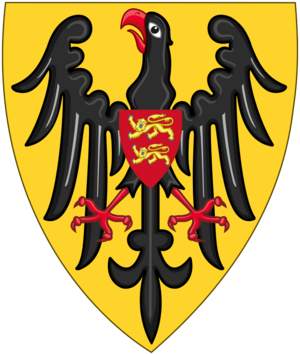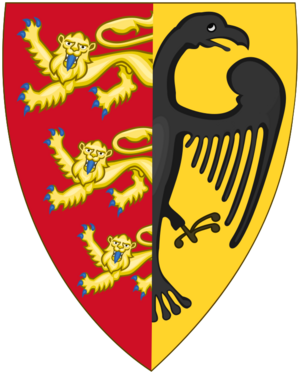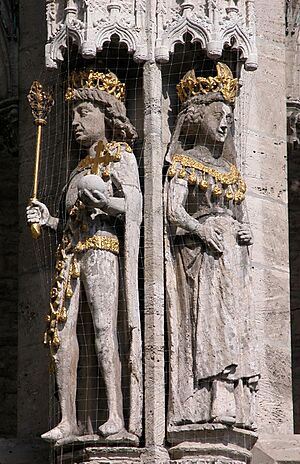Otto IV, Holy Roman Emperor facts for kids
Quick facts for kids Otto IV |
|
|---|---|
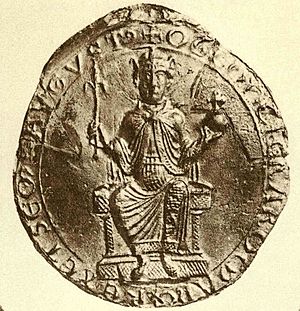
Seal of Otto IV
|
|
| Holy Roman Emperor | |
| Reign | 1209–1218 |
| Coronation | 21 October 1209, Rome |
| Predecessor | Henry VI |
| Successor | Frederick II |
| King of the Romans | |
| Reign | 1198–1209 |
| Coronation | 12 July 1198, Aachen |
| Predecessor | Henry VI |
| Successor | Frederick II |
| King of Italy | |
| Reign | 1208–1212 |
| Predecessor | Henry VI |
| Successor | Henry VII |
| King of Burgundy | |
| Reign | 1208–1215 |
| Predecessor | Philip of Swabia |
| Successor | Frederick II |
| Born | 1175 |
| Died | 19 May 1218 (aged 42-43) Harzburg |
| Burial | Brunswick Cathedral |
| Spouse |
Maria of Brabant
(m. 1214) |
| House | Welf |
| Father | Henry the Lion |
| Mother | Matilda of England |
| Religion | Roman Catholicism |
Otto IV (born 1175 – died 19 May 1218) was the Holy Roman Emperor from 1209 until his death. He was the only German king from the House of Welf family.
Otto spent much of his early life in England and France. He was a supporter of his uncle, Richard the Lionheart. Richard made him the Count of Poitou in 1196. With Richard's help, Otto was chosen as King of Germany in 1198. However, another group of nobles chose a different king, starting a ten-year civil war. When his rival, Philip of Swabia, died in 1208, Otto became the only king of Germany.
In 1209, Otto traveled to Italy to be crowned emperor by Pope Innocent III. But in 1210, he tried to join the Kingdom of Sicily with the Empire. This angered Pope Innocent III, who then excommunicated him (removed him from the Church). Otto later teamed up with England against France. Their alliance was defeated at the Battle of Bouvines in 1214. Most of his supporters left him in 1215. He spent the rest of his life quietly on his lands near Brunswick.
Contents
Otto's Life and Reign
Early Years and Family
Otto was born in 1175. He was the third son of Henry the Lion, who was the Duke of Bavaria and Saxony. His mother was Matilda of England. Otto grew up in England, cared for by his grandfather, King Henry II of England. He learned to speak both French and German very well. His uncle, King Richard I of England, became like a father to him. In 1196, Richard made Otto the Count of Poitou. This was a powerful position in France.
Becoming King of Germany
After Emperor Henry VI died, there was a big disagreement over who should be the next king. Most princes in the south of the Empire chose Henry's brother, Philip of Swabia. But other princes, with help from Richard of England, wanted a king from the House of Welf. Otto was chosen by his supporters in Cologne on June 9, 1198.
Otto quickly took control of Aachen, the traditional city for coronations. He was crowned king on July 12, 1198. The Archbishop of Cologne performed the ceremony. This was important because only he could crown the king of the Romans. The real crown jewels were held by Philip's family. So, Otto was crowned with different ones.
Civil War and Papal Support
Otto's election pulled the Empire into a conflict between England and France. Philip allied with the French king, Philip II of France. Otto was supported by Richard I, and later by Richard's brother, John of England.
Meanwhile, Pope Innocent III wanted to keep the Kingdom of Sicily separate from the Holy Roman Empire. He supported Otto because Otto's family had always been against Philip's family. Otto also seemed willing to agree to the Pope's demands. In 1201, Pope Innocent III announced that Otto was the only true king. In return, Otto promised to support the Pope's interests in Italy.
Struggles and Philip's Death
Otto's situation got worse when England lost a battle to France. This meant Otto lost England's money. Many of his allies, including his own brother, switched to Philip's side. Otto was defeated in battle by Philip in 1206. He had to go back to his lands near Brunswick. This left Philip as the main ruler in Germany.
Pope Innocent III tried to make peace between them. Philip offered to marry his daughter, Beatrix, to Otto. He also offered Otto land and money. But Otto refused. Just as the war was about to start again, Philip was murdered on June 21, 1208.
After Philip's death, Otto made peace with Philip's family. He agreed to marry Philip's daughter, Beatrix. In November 1208, all the princes supported Otto. He promised not to try to make the imperial crown hereditary for his children. Now, Otto was fully friends with the Pope again. He prepared to be crowned Holy Roman Emperor. He promised the Pope to return lands that belonged to the Church.
Otto traveled through Italy and was crowned King of Italy in Milan in 1208. He met Pope Innocent III in Viterbo. On October 4, 1209, he was crowned emperor by the Pope in St. Peter's Basilica in Rome. However, riots broke out in Rome, and Otto had to leave the city.
Conflict with the Pope
After leaving Rome, Otto marched north. He soon decided to break his promises to the Pope. Otto wanted to bring back imperial power in Italy. He removed the Pope's soldiers from some areas and claimed them as his own. He also demanded that Frederick, the King of Sicily, show loyalty to him. When Frederick refused, Otto declared that Frederick had lost his right to those lands. Otto even marched towards Rome.
These actions made Pope Innocent III very angry. On November 18, 1210, the Pope excommunicated Otto. This meant Otto was no longer considered a member of the Church. The Pope then tried to conquer Sicily, which was protected by Frederick.
At the same time, German nobles were getting tired of Otto. They felt he was spending too much time in Italy. They believed he should be defending the northern parts of the Empire from Valdemar II of Denmark. Valdemar had taken advantage of Otto's absence and invaded northern lands. So, while Otto was in Italy, many German princes chose Frederick as the new King of the Romans in 1211.
Otto returned to Germany to deal with the situation. He found that most German princes and bishops had turned against him. Frederick had traveled through Italy and arrived in Germany. In September 1212, after Beatrix died, most of Otto's former supporters left him for Frederick. Otto had to retreat to Cologne. On December 5, 1212, Frederick was elected king for a second time.
Battle of Bouvines and Final Years
King Philip II of France supported Frederick. This made King John of England support his nephew, Otto. In 1213, the English destroyed the French fleet. King John planned to invade France. Otto saw this as a chance to weaken Frederick's French support and gain prestige. He agreed to join John's invasion. In February 1214, John attacked from one side, and Otto, with the Count of Flanders, was supposed to attack from another. However, their armies could not work together well.
On July 27, 1214, Otto's army met Philip's army at the Battle of Bouvines. Philip's army had about 15,000 soldiers, while the allied forces had around 25,000. It was a very close battle. But Otto's horse was wounded and ran off the field, carrying Otto with it. This caused his soldiers to give up.
Because of this defeat, Otto was forced to go back to his private lands near Brunswick. He was officially removed from power in 1215. Otto died from an illness at Harzburg castle on May 19, 1218. He asked for forgiveness for his sins. He is buried in Brunswick Cathedral, where his parents are also buried.
Family Life
Otto was connected to every other King of Germany through his family. He was married two times:
- In 1209 or 1212, he married Beatrice of Swabia. She was the daughter of the German King Philip of Swabia.
- On May 19, 1214, in Aachen, he married Maria of Brabant. She was the daughter of Henry I, Duke of Brabant.
Otto did not have any children from either marriage.
Images for kids
-
Otto IV and Pope Innocent III shake hands
See also
 In Spanish: Otón IV del Sacro Imperio Romano Germánico para niños
In Spanish: Otón IV del Sacro Imperio Romano Germánico para niños
 | Percy Lavon Julian |
 | Katherine Johnson |
 | George Washington Carver |
 | Annie Easley |


